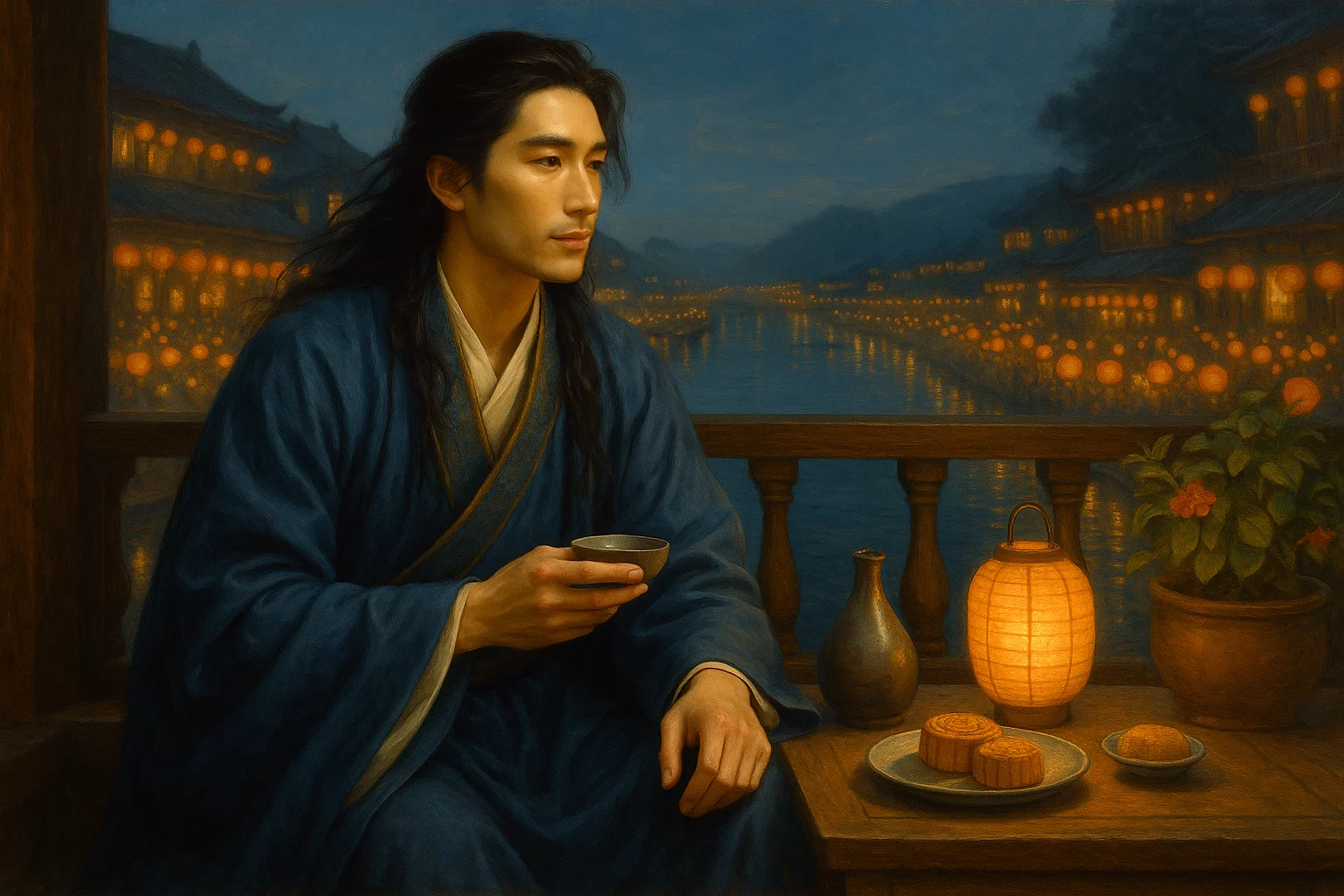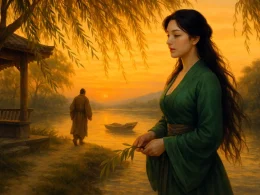The dagger gleams like frozen stream,
Wu salt bleaches beyond moonbeam.
Her blade-slender fingers peel the fruit—
Broidered drapes exhale perfume,
Incense coils in the room,
We sit close, reed-organs tuning mute.
She murmurs: "Where to rest tonight?
The watchtower strikes three.
Your horse would slip on glassed frost—
Best remain...
The streets are voids where ghosts are lost."
Original Poem
「少年游 · 并刀如水」
周邦彦
并刀如水,吴盐胜雪,纤手破新橙。
锦幄初温,兽烟不断,相对坐调笙。
低声问:向谁行宿?城上已三更。
马滑霜浓,不如休去,直是少人行!
Interpretation
Composed during the late Northern Song Dynasty, this ci poem captures an intimate rendezvous between Zhou Bangyan and the famed courtesan Li Shishi. Historical accounts describe how Emperor Huizong, having heard of Li's beauty, once visited her incognito—only to find Zhou already present. In a panic, Zhou hid beneath the bed, overhearing the emperor's flirtatious banter with Li. Later, he transmuted this risqué experience into verse, crafting a work that delicately portrays clandestine romance through tender details and whispered sweet nothings. Notable for its vivid domesticity and psychological nuance, the poem stands among the most lifelike and emotionally authentic works of Northern Song lyric poetry.
First Stanza: "并刀如水,吴盐胜雪,纤手破新橙。锦幄初温,兽烟不断,相对坐调笙。"
Bìng dāo rú shuǐ, wú yán shèng xuě, xiān shǒu pò xīn chéng. Jǐn wò chū wēn, shòu yān bù duàn, xiāng duì zuò tiáo shēng.
Bingzhou scissors gleam like water,
Wu salt outshines snow's white—
slender fingers peel a fresh orange.
Broidered drapes grow warm,
beast-shaped incense spirals ceaseless,
as we sit facing, tuning sheng reeds.
The opening triad dazzles with sensory immediacy: metallic sheen ("gleam like water"), crystalline whiteness ("outshines snow"), and tactile delicacy ("slender fingers"). "Peeling a fresh orange" (破新橙) operates on multiple levels—as literal hospitality, erotic suggestion (the fruit's segmentation mirroring unfolding intimacy), and aesthetic ceremony. The subsequent lines construct an enclave of cultivated pleasure: textiles ("broidered drapes"), perfumed air ("incense spirals"), and musical collaboration ("tuning sheng reeds") compose a sanctuary where romance and artistry intertwine. The sheng (笙), a harmonious instrument, becomes metaphor for attuned hearts.
Second Stanza: "低声问:向谁行宿?城上已三更。马滑霜浓,不如休去,直是少人行。"
Dī shēng wèn: Xiàng shéi xíng sù? Chéng shàng yǐ sān gēng. Mǎ huá shuāng nóng, bù rú xiū qù, zhí shì shǎo rén xíng.
Her whisper: "Where will you lodge tonight?
The watchtower strikes third watch already.
Hooves would slip on thick frost—
better not to venture out,
when few now walk the streets."
Here, narrative perspective shifts to the woman's murmured entreaty. The watchtower's time signal (三更) marks the midnight hour when respectable society sleeps, heightening the scene's illicit frisson. Her ostensibly practical concerns—"hooves slipping on frost" (马滑霜浓)—mask tender solicitude, while the subjunctive "better not to venture out" (不如休去) conveys unspoken longing through negative suggestion. The closing observation about deserted streets (少人行) implies both safety in secrecy and loneliness averted, wrapping persuasion in pragmatic guise.
Holistic Appreciation
This ci distinguishes itself through its chamber-music intimacy and psychological choreography. The first stanza, observed through the male gaze, builds sensuous atmosphere through curated objects and shared musicianship—each detail (scissors, salt, orange, sheng) a brushstroke in a still life vibrating with latent desire. The second stanza's ventriloquized feminine voice reveals Zhou's genius for indirect characterization: the woman's ostensibly casual remarks ("Where will you lodge?") tremble with unvoiced urgency, her syntax bending toward invitation without explicit demand.
Structurally, the poem moves from visual tableaux to verbal interplay, from preparation ("peeling orange") to negotiation ("whispered exchange"), enacting romance's progression through aestheticized domesticity. The subtextual currents—the emperor's unseen presence, Zhou's literal hiding, the lovers' metaphorical concealment—add layers of dramatic irony and meta-poetic resonance.
Artistic Merits
- Object-based eroticism
Every household item becomes charged with intimacy—scissors (cutting), salt (preserving), orange (segmenting), sheng (joining)—forming a symbolic lexicon of desire. - Psychological ventriloquism
The woman's dialogue masterfully implies what social decorum forbids her to state directly, showcasing Zhou's understanding of feminine indirection in courtship. - Temporal tension
The "third watch" (三更) deadline injects narrative urgency into lyrical description, balancing timeless romance against night's fleeting hours. - Sensory orchestration
Visual (gleaming scissors), tactile (frost-slicked hooves), olfactory (incense), auditory (whispers, sheng) elements merge into synesthetic immersion.
Insights
Zhou's poem unveils the paradox of clandestine love: how stolen moments require meticulous staging (the peeled orange, tuned sheng) to transcend their transience. The woman's pragmatic argument against departure ("hooves would slip") mirrors love's eternal strategy—using reason to defend passion's unreason.
For contemporary readers, the work demonstrates how constraints (social propriety, the emperor's looming presence) intensify artistic expression. Zhou transforms a compromising situation (hiding under a bed) into poetic gold, proving that limitation breeds creativity. The whispered dialogue also models how meaningful communication often resides not in declarations but in what lingers unsaid—the space between "frost" and "stay."
Ultimately, the poem celebrates romance as collaborative art—where peeling fruit becomes ritual, tuning instruments metaphor, and whispered words the most persuasive poetry of all.
About the Poet

Zhou Bangyan (周邦彦 1056 - 1121), a native of Qiantang (modern Hangzhou, Zhejiang), was the culminating master of the wanyue (graceful and restrained) ci poetry of the Northern Song Dynasty. A virtuoso in musical temperament, his ci are renowned for their opulent refinement and technical perfection. He created dozens of new melodic patterns (cipai) and adhered to strict tonal rules, earning him the title "Crown of Ci Poets." His influence extended to Southern Song masters like Jiang Kui and Wu Wenying, establishing him as the founding patriarch of the Rhymed Ci School.












